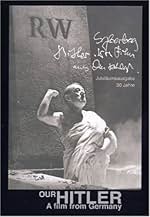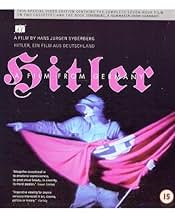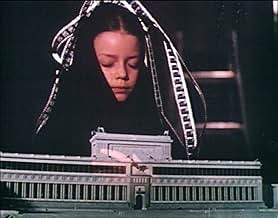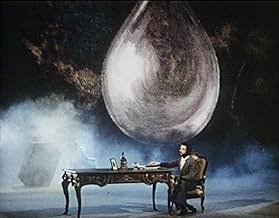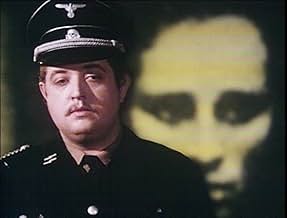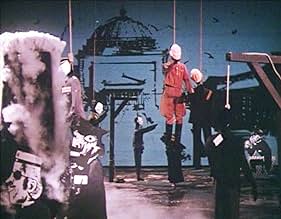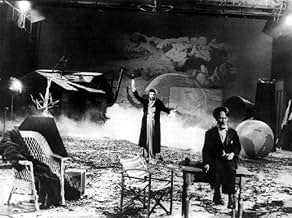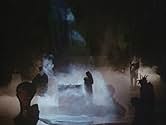Warning. This is not a movie for an evening of entertainment. Its is 8 hours of surreal images about mass media combining with trivialized pop culture versions of German romantic irrationalizm to create that phenomenon called Hitler, which will never leave the dark corners of human nightmares and the strange world of pop mythology.
I've seen this film twice in a cinema (Berkeley, CA) when it came around. Obviously people willing to subject themselves to eight hours of surrealist images about Hitler as the Great Communicator (the original for you Reagan fans) are going to go in a bit prejudiced. I had not yet seen any other Syberberg films nor read anything about him or his films, as I wanted to experience this for it's own sake without preconceived notions. After intermission, my friend, a warehouse manager, and I couldn't wait to see the rest. The same was true when it returned a few years later and I saw it with an artist friend, who was even more excited. We heard similar buzz from the people around us at intermission. This movie was something special, and after all these years, having re-read the screenplay and amazed at the images, I'd see it again for an all nighter. But I don't really have to because I can replay most of the scenes in my head at any time -- they were that striking and memorable. I guess part of that may have to do with the fact that I am born German, and was once a student of modern German literature, theater, art and lived in Munich when artists like Handke, Thomas Bernhard, Max Frish, Fassbinder, Herzog, Wenders and Syberberg challenged the status quo and awoke Germans to the idea that there is something else besides Brecht, Grass and sighing the Mea Culpa over the Third Reich.
Syberberg had already done films that were hard to get shown (this was before the Video Revolution) and with Hitler he really went overboard. This film could never be a commercial success, but it was worth the making and seeing. It creates images, meant for someone who is steeped in German mythos while at the same time aware of the changes wrought on world media by Edison's invention of the moving pictures. Combine these with mass communication capability, the capability to entrance the masses with the images they want to identify with is the history of both Hitler and Movies. So for eight hours Syberberg bombards the viewer with images of the Black Mary (Edison's studio) as a backdrop, Hitler rising out of Wagners grave in a Roman toga, Radio tranmissions of SS Troopers singing Silent Night direct from Stalingrad, touching personal reminiscances by Hitler's butler of how he liked his underwear pressed, his projectionist eating a sausage picknick at the old Eagle's Nest talking about what a nice regular guy his old boss was.
In short, this movie fills the viewer with indellible images of the capability of mass media to suck in the viewers, give them a sense of intimacy, and trivialize mass murder from a "real life human perspective." No single scene or sermon or 90 minute expose of Auschwitz can ever hope to drive home the real insanity of the mass delusions which created the greatest tragedy of this century. And for Germans the constant cleansing and coping escapism of the post war era (It wasn't us, it was those few bad guys that are now dead) needed a real response by the generation that was born afterwards. And the only way Syberberg could do that was to let all those images of the collective German memory of the great history of its irrationalism and romanticism fight against the attempt to rationalize it's rape by their own philestines.
Memorable quotes include the famous "Every time I hear the word Art I reach for my pistol."
Particularly good are Andre Heller as the melancholy narrator, the dialog between Himmler and his masseur, Christmas stories, and touching human stories about Hitler and his beloved doggies. Those skits are kind of like a news magazine story about the human side of John Wayne Gacey as Bunel and Dali might have filmed it.

